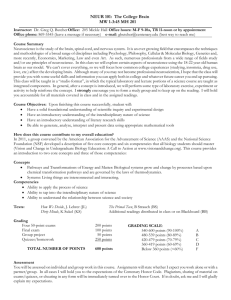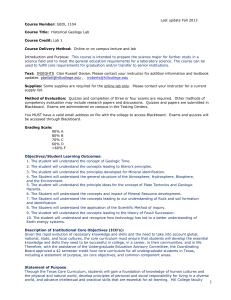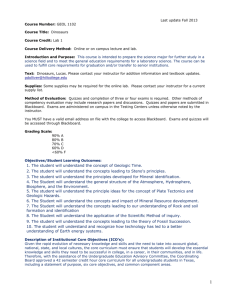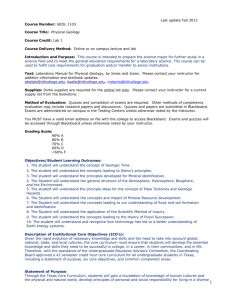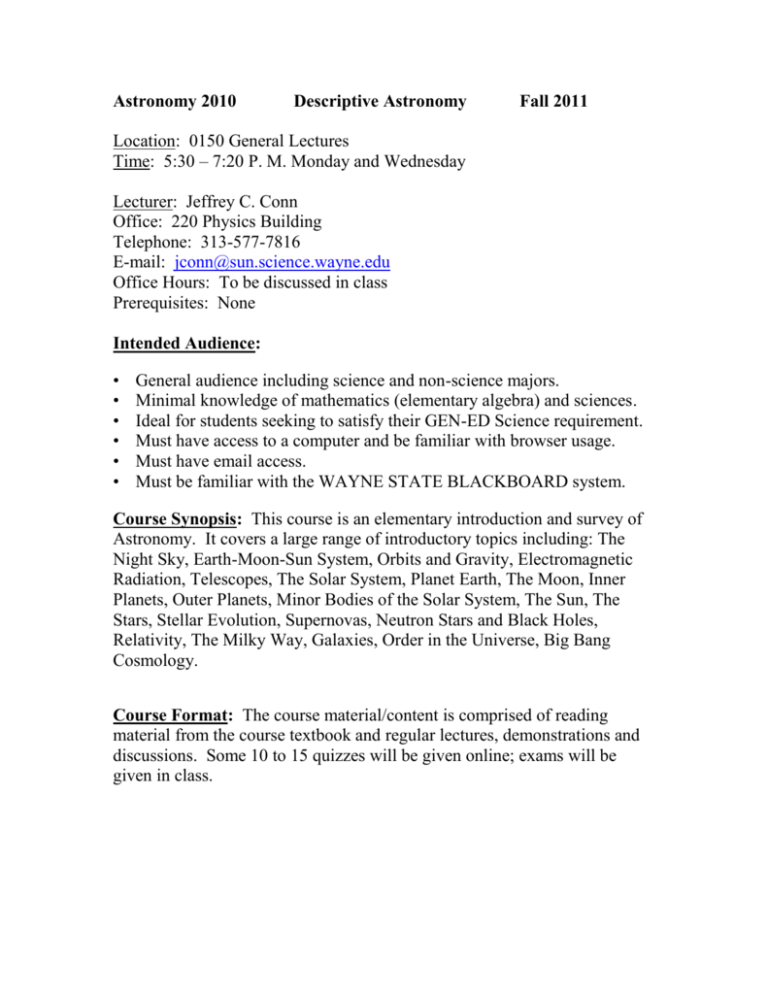
Astronomy 2010
Descriptive Astronomy
Fall 2011
Location: 0150 General Lectures
Time: 5:30 – 7:20 P. M. Monday and Wednesday
Lecturer: Jeffrey C. Conn
Office: 220 Physics Building
Telephone: 313-577-7816
E-mail: jconn@sun.science.wayne.edu
Office Hours: To be discussed in class
Prerequisites: None
Intended Audience:
•
•
•
•
•
•
General audience including science and non-science majors.
Minimal knowledge of mathematics (elementary algebra) and sciences.
Ideal for students seeking to satisfy their GEN-ED Science requirement.
Must have access to a computer and be familiar with browser usage.
Must have email access.
Must be familiar with the WAYNE STATE BLACKBOARD system.
Course Synopsis: This course is an elementary introduction and survey of
Astronomy. It covers a large range of introductory topics including: The
Night Sky, Earth-Moon-Sun System, Orbits and Gravity, Electromagnetic
Radiation, Telescopes, The Solar System, Planet Earth, The Moon, Inner
Planets, Outer Planets, Minor Bodies of the Solar System, The Sun, The
Stars, Stellar Evolution, Supernovas, Neutron Stars and Black Holes,
Relativity, The Milky Way, Galaxies, Order in the Universe, Big Bang
Cosmology.
Course Format: The course material/content is comprised of reading
material from the course textbook and regular lectures, demonstrations and
discussions. Some 10 to 15 quizzes will be given online; exams will be
given in class.
-2Astronomy 2010
Descriptive Astronomy
Fall 2011
Blackboard System: (http://blackboard.wayne.edu)
Blackboard is used for course announcements, course documents, online
quizzes, and other general information related to the course.
If you are not familiar with Blackboard, obtain your login ID and password
as soon as possible; and immediately test your ability to log on to, navigate,
and understand Blackboard and its various features.
Textbook: “Pathways to Astronomy”, by Schneider and Arny, 3rd Edition,
McGrawHill Publisher.
The textbook is available for purchase at Barnes and Nobles on campus specially priced for Wayne State students; and is also available through
various ONLINE vendors. -- Do not expect the same discount.
A few copies are on reserve at the David Adamani Library - but are only
available for a few hours at a time.
You may consider buying a used copy from past students or resellers.
The 2nd edition is acceptable.
[Be aware that Schneider and Arny have a two- volume edition of the
textbook. DO NOT BUY THAT EDITION.]
Note: Unlike the classical astronomy textbook, the textbook for this
course consists of 86 Units. Units are relatively brief and more focused than
the usual, longer chapters in a classical textbook. A large fraction of the 86
Units will be covered in this course.
Course Web Site: http://ast2010.physics.wayne.edu
The course website provides weekly reading assignments and unit
objectives, self-test questions, a link to lecture (power point presentation and
pdf) notes, and lexicon/glossary.
You need to supply the username ast2010 and password Fall2011 to be
granted access to the site.
-3Astronomy 2010
Descriptive Astronomy
Fall 2011
Laboratory:
An optional laboratory, AST 2011, is offered with this course.
Grades are given separately. Students taking the optional laboratory
concurrently with AST 2010 will satisfy the University Group Requirement
of a Natural Science Course with Laboratory. A separate Astronomy
Laboratory Manual must be purchased and brought to the first lab session.
Labs meet in Room 134 Physics Building (666 W. Hancock).
Reading Assignments:
In a class that covers so many topics, it is important to keep current with the
lecture material (that is, the text Units).
And always be sure to read the related material before taking the Quizzes.
Reading material includes the textbook units, and the lecture notes which
will be posted on Blackboard.
See Blackboard or the course website: http://ast2010.physics.wayne.edu for
reading assignments and other suggestions.
Self-Study Tests (Self-Tests):
Self-test questions for each study unit are available online at the course
website: http://ast2010.physics.wayne.edu
Self-tests are provided to help you identify the material to read, to focus on,
understand, and remember.
DO NOT submit your answers to the self-test questions. You will NOT be
graded on self-tests.
Answers to the self-test questions are posted, but you are strongly advised to
read the material from the textbook and review lectures slides before looking
at the answers.
-4Astronomy 2010
Descriptive Astronomy
Fall 2011
Weekly Quizzes:
Quizzes will be given every week or so. They are given ONLINE using the
Blackboard automated grading system.
Quizzes can be taken from home, campus, or any location from which you
have access to a computer equipped with a browser, and that is connected to
the internet.
Typically, each quiz consists of 8 – 10 multiple choice and fill-in-the-blank
questions.
Generally, there will be one full week available for taking each quiz after it
is posted on blackboard. Times will be announced. Any changes to this
practice will be announced in class and on Blackboard.
The material covered on quizzes will be taken from lecture material and
textbook topics.
There is no partial credit for ONLINE quizzes.
There are no makeup quizzes.
Do not wait till the last minute to complete a quiz. Quizzes CANNOT be
taken after their due date and time.
Do not forget to press/click the SUBMIT button. Note that once the
SUBMIT button is clicked your answer is submitted and cannot be changed.
So think twice before clicking; but do not forget to click...
Quiz 0 will be a practice quiz, which allows students to familiarize
themselves with the Blackboard system. You get 10 points just for
taking it. So be sure to take Quiz 0!
The lowest two quiz scores of your regular quizzes (i.e., excluding quiz 0)
will be dropped in the calculation of your final grade.
Any change to this policy will be discussed in class.
-5Astronomy 2010
Descriptive Astronomy
Fall 2011
Exams:
There will be three PARTIAL exams and one FINAL exam.
Partial exams will consist of roughly 50 multiple choice and true/false
questions, fill-in-the-blank, and simple calculation questions. The Final
Exam will consist of approximately 75-100 questions of similar types.
Any changes to this format will be discussed in class and posted on
Blackboard. Material covered on each exam will be announced in class and
through the Blackboard system.
The lowest score of the three partial exams will be dropped.
There are no make-up exams.
The Final Exam will be taken during the University Final Exam week at a
date and time specified by the University. Please see the University’s event
schedule for the exact date.
If you miss two or more exams, your course final grade will
automatically be “F” – NO EXCEPTIONS.
Planetarium Visits:
Two visits to the Wayne State University Planetarium will be organized.
As the planetarium has a limited number of seats, many presentations of
each of the two different shows will be offered.
Date and time of the presentations will be posted on the planetarium website
http://physics.wayne.edu/~planetarium and on the course website as well;
you will be informed of the procedure for signing up for a particular
presentation.
You will receive extra credit for attending the planetarium shows. Each
visit (with attendance officially signed for at the planetarium) will count
for 2.5 percent worth of extra credit.
-6Astronomy 2010
Descriptive Astronomy
Fall 2011
Grading: Grades will be determined based on performance on Weekly
Quizzes, Three Partial Exams and a Final Exam; plus extra credit.
Grading/Performance Evaluation
Your final grade in this course will be based on the following factors:
Home-work/Blackboard Quizzes:
40%
Best two of three Partial Exams:
30% - Each partial counts for 15%
Final exam:
30%
Total:
100%
Grading Scheme: Final grades will be assigned according to the following
table.
A
95 - 100 %
A90 - 94
B+ 85 - 89
B
80 - 84
B75 - 79
C+ 70 - 74
C
65 - 69
C60 - 64
D+ 55 - 59
D
51 - 54
D<50
F
If two or more exams are missing.
No make-up exams will be given. The lowest score of the three grades
achieved on the first three partial exams will be dropped. Thus, for
example, if one were to miss one of the partial exams, that one missed exam,
of the first three (partial) exams, could therefore be used as the dropped
score. The Final exam score cannot be dropped.
Any changes to the above grading scheme will be discussed in class and
posted.
-7Astronomy 2010
Descriptive Astronomy
Fall 2011
Note:
All quiz, partial and final exam scores will be posted on Blackboard.
Final grades will be posted on Pipeline.
Schedule for Quizzes and Exams:
Dates for Quizzes, Partial and Final Exams will be discussed in class and
posted on Blackboard.
Also Note: There is a large amount of material presented in this class.
Therefore it is strongly recommended that students:
Not wait until the last minute to prepare for quizzes or exams;
Read the chapters (units) in the text book, weekly;
Attempt to solve the quiz questions/problems, weekly;
Try all self-test questions.
A sample of Other Sources of Interest
Textbooks:
Voyages through the Universe, Fraknoi, Morrison and Wolff; Saunders,
2000 Edition;
The Cosmic Perspective, Bennett, Donahue, Schneider, Voit; AddisonWesley, 5th Edition;
Astronomy, A Beginner’s Guide to the Universe, Chaisson and
McMillan; Pearson Prentice Hall, 4th Edition;
Astronomy, Journey to the Cosmic Frontier, J. D. Fix; McGraw Hill, 2nd
Edition;
Discovering the Universe, Comins and Kaufman lll; Freeman, 5th Ed.;
General Books:
Nightwatch by Terence Dickinson;
Cosmos by Carl Sagan
Magazines:
Sky and Telescope; Astronomy;
Internet: The Astronomy Picture of the Day (APOD); The Space
Science Institute (Hubble Space Telescope); NASA
-8Astronomy 2010
Descriptive Astronomy
Fall 2011
Attention Students with Disabilities:
If you have a documented disability that requires accommodations, you
will need to register with Student Disability Services (SDS) for
coordination of your academic accommodations. The Student Disability
Services (SDS) office is located at 1600 David Adamany Undergraduate
Library in the Student Academic Success Services department. SDS
telephone number is 313-577-1851 or 313-577-3365 (TDD only). Once
you have your accommodations in place, I will be glad to meet with you
privately during my office hours to discuss your special needs. Student
Disability Services’ mission is to assist the university in creating an
accessible community where students with disabilities have an equal
opportunity to fully participate in their educational experience at
Wayne State University.
Please be aware that a delay in getting SDS accommodation letters for
the current semester may hinder the availability or facilitation of those
accommodations in a timely manner. Therefore, it is in your best
interest to get your accommodation letters as early in the semester as
possible.
SDS News:
Effective Fall Semester 2010 Student Disability Services will be implementing a revised
alternative testing form when a student schedules classroom exams/quizzes
administration at SDS. As before the student and instructor each have a portion to
complete. Exams are to be mailed to a new password protected email address:
sdsexams2010@wayne.edu.

